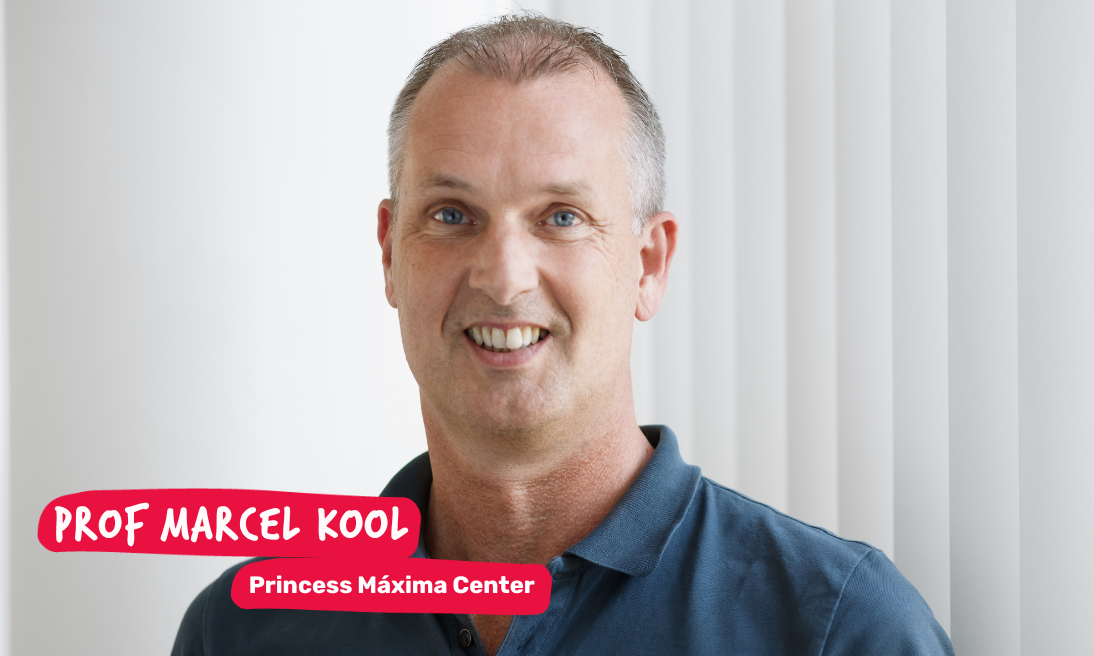Growing model brains in the search for new treatments
Fast facts
- Official title: Cerebellar Organoid Modelling of Medulloblastoma to Accelerate New Discoveries (COMMAND)
- Lead researcher: Professor Marcel Kool, Professor Esther Becker
- Where: Princess Máxima Center, Utrecht & University of Oxford, UK
- When: July 2023 – June 2028
- Cost: £1.5 million over 5 years
- Research type: Paediatric, Medulloblastoma (High grade), Academic, Tumour biology, Quest for cures
- Award type: Quest for cures
Medulloblastomas are one of the most common aggressive brain tumours found in children.
These tumours are fast-growing, highly likely to spread and usually develop in a part of the brain called the cerebellum, which is an area responsible for controlling coordination and balance. The prognosis for children diagnosed with medulloblastoma is poor, and the available treatments for this type of brain tumour come with a wide range of potentially serious side effects which can dramatically affect quality of life.
What is it?
This project draws on the expertise of researchers from several different laboratories around the world, and showcases just how important collaboration between scientists working in different areas is for research to progress. This international team of researchers, led by Professor Kool and Professor Becker, will use new, advanced cell culture techniques – where researchers grow cells in a laboratory – to grow human organ structures from stem cells (cells that can turn into any cell types). These structures will imitate the growth and development of the cerebellum, allowing scientists to study the cells that medulloblastomas arise from in more detail than has previously been possible.
In order to further understand the way in which normal, healthy cells can begin to form tumours, researchers will use these lab-grown cells to explore the changes in DNA that lead to the growth of tumours. These models will allow them to study how cells are altered to form tumours, and will enable them to explore treatment options by performing drug screens. The data from these studies will go through rigorous analysis to determine how well the cell culture models are representing the real life patient situation.
Why it’s important
Medulloblastomas have been divided into four groups. Tumours in each of these groups will respond differently to treatments. To find novel, effective therapeutics for medulloblastoma, we need to understand more about how and why these tumours develop and respond differently to treatment.
There is a desperate need for viable, effective treatments that are targeted towards each type of medulloblastoma. Currently, medulloblastomas are normally treated using a combination of surgery, radiotherapy and chemotherapy, with varied results, and having significant impacts on quality of life. This project aims to better our understanding of different types of medulloblastoma and inform the development of effective treatments, tailored to each subtype of tumour.
Who it will help
Medulloblastoma is one of the most common aggressive brain tumours in children. Despite aggressive therapies, prognosis is poor for children with this diagnosis. There are often serious long-term side effects caused by these tumours and the available treatments; advancing our understanding of these brain tumours, and finding treatments with fewer serious side effects would improve quality of life for children greatly, and bring us closer to finding a cure.
Recent advances in neuroscience now allow us to mimic human brain development in a dish. By introducing tumour-causing mutations into these cultured cells, we can study how and in which cells tumours are formed, and test drugs. With our international team of experts in neuroscience and tumour biology, we are using this innovative approach to fight medulloblastoma.
– Professor Marcel Kool
Research is just one other way your regular gift can make a difference
Research is the only way we will discover kinder, more effective treatments and, ultimately, stamp out brain tumours – for good! However, brain tumours are complex and research in to them takes a great deal of time and money.
Across the UK, over 100,000 families are facing the overwhelming diagnosis of a brain tumour and it is only through the generosity of people like you can we continue to help them.
But, by setting up a regular gift – as little as £2 per month – you can ensure that families no longer face this destructive disease.
In this section

Professor Marcel Kool
Professor Marcel Kool is a leading expert in paediatric brain tumours, and his work focuses on precision diagnostics and innovative therapies. He leads a research group at the Hopp Children’s Cancer Center Heidelberg (KiTZ), Germany, and the Princess Máxima Center in Utrecht, and has recently been appointed as Professor of Childhood brain tumours at the University Medical Center in Utrecht.